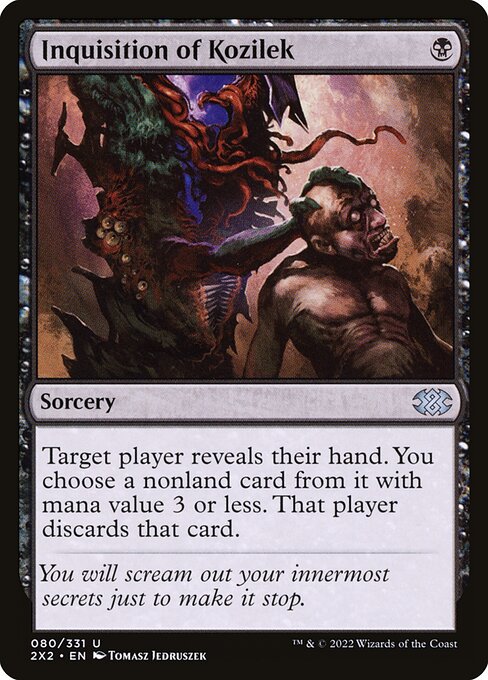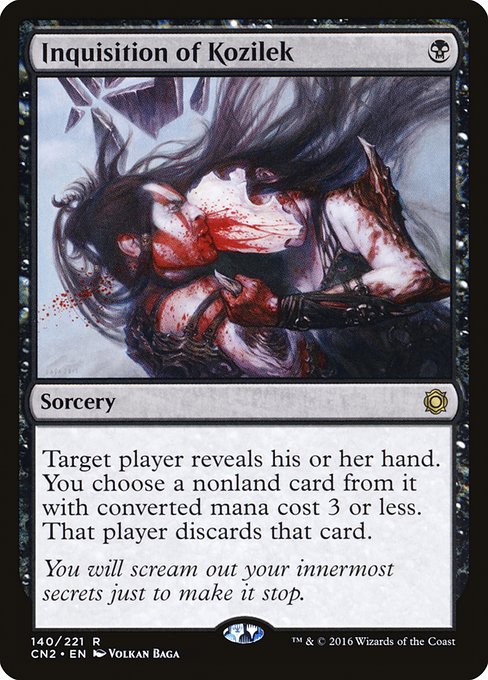I started playing Magic: The Gathering a few months ago (in my 40th year), even though I’d known about the game since it debuted when I was about 11 years old. But the cardboard finally hooked me. And like many players, I did a deep dive on everything I could learn: abbreviations, decklists, lingo, LGS banter, lore, flavor text, what a Spike was, what a Jimmy was, and so on. I quickly found that my preferred style was control, and my favorite color was black.
I guess I’m a swampy kinda person. I’m also a professor of rhetoric and composition, and a fiction writer, so I subsequently became obsessed with the psychology and metaphilosophy (and poetry) of the black cards. And today, I want to begin a close look at some of the black Magic cards that represents, for me, an entry point into what are all about. I will start with Inquisition of Kozilek.

Part 1: Give Up
For one black mana, Inquisition of Kozilek wants to know. That’s a cheap price to force someone to spill their hand. (Thoughtseize is also cheap—but cheap for a price of two life.) What does Kozilek want from you? It wants you to reveal yourself to another. And that, to be honest, is a natural impulse. Maybe the most human impulse. As the first line of Aristotle’s Metaphysics says: “All men by nature desire to know.” Which is to say, all people want to know. Everyone wants to find something out.
The card’s mechanic is a basic instinct, then. As a writer of horror and devotee of blackness, I am suspicious and respectful of the desire to know. As a rhetorician, I start here because one of rhetoric’s aims as the art of persuasion is to help make decisions from uncertain situations. To bring those who have less information around to your side. Or to bring them to the side that you want them on.
The card’s text reads: “Target player reveals his or her hand. You choose a nonland card from it with converted mana cost 3 or less. That player discards that card.”
Target player reveals his or her hand.
One could say that Inquisition of Kozilek keeps the game honest, even though only one player knows that much more information. The card is great for Ragavan, Nimble Pilferer, Expressive Iteration, Lightning Bolt, and so on. However, what if an opponent has a powerful card greater than 3 mana? The Grief and Solitude and Murktide Regents of the world.
What if an opponent has a powerful truth or secret greater than you’re capable of handling? How much do we want to know? Ostensibly, we inquisition people to find out what they’re holding, and we do it to remove threats. But, from an outside-the-game standpoint, rhetorically, what if someone’s “hand” holds no threats? What if their hand holds truths? Evasions? Jokes? The question then becomes: What’s the risk of inquiry?

Rhetoric is, among other things, the art of persuasion. It is also a series of linguistic tropes, many of which are bases for lines of inquiry or argument. For example, the trope of (wait for it) antimetabole. This one is the basis for President John F. Kennedy’s famous: “Ask not what your country can do for you, but what you can do for your country.” And for my motto: “Do I play mono black control because I’m broken, or am I broken because I play mono black control?” The reversal of the terms automatically creates a tension, a question, an argumentative position.
Black cards in Magic: The Gathering have a number of aims. Discard, disruption, sacrifice, recursion, bringing what was once thought dead back into action. And they represent many mainstay horror creatures. The vampire, the zombie, the eldritch being from beyond the stars. Black cards are focused on removal, annihilation, control. To reveal or uncover ourselves to another. To lay bare what we’re trying to keep secret and hidden. It’s everything we, as social beings, want—and, ironically, it’s the last thing we want. The rhetoric of the skull is contradictory. The art of keeping close while pushing away. The art of deprivation, the hair shirt, self-flagellation.
Part 2: The Little Things
You choose a nonland card from it with converted mana cost 3 or less.
To consider the nonland cards, let’s consider the lands first. The basics. Forest, Mountain, Plains, Island, Swamp. These are often the most sacred cards in Magic, because without them, there could be no game. And what is it that Inquisition of Kozilek can choose? It can choose what is not that. What isn’t fundamental. But at the same time, it cannot allow you to choose the most immense cards. The highest cost. And so, one has a small window to operate within. To some degree, Inquisition has you focus on the little things that belie their littleness.
Yet we have no choice but to do this. We are time-bound and cannot take in all the worldly information, so we must make small, framed choices about the uncertainties we face. Kenneth Burke, a famous rhetorician of the 20th century, said we all operate through “terministic screens.” That is, the words we use come with contextual baggage. That baggage inflects how we interpret the world. He writes:
“Even if any given terminology is a reflection of reality, by its very nature as a terminology it must be a selection of reality; and to this extent it must function also as a deflection of reality.”
In other words: We cannot know everything. To know everything isn’t a valid goal. Since Kozilek is an eldritch-type being, a cosmic horror, we can look to H.P. Lovecraft for further insight:
“The most merciful thing in the world, I think, is the inability of the human mind to correlate all its contents. We live on a placid island of ignorance in the midst of black seas of infinity, and it was not meant that we should voyage far.”
The Strixhaven: Mystical Archives version of Inquisition of Kozilek has as its flavor text: To dwell within the Blind Eternities is unthinkable. To encounter those who do could shatter the mind.

The Blind Eternities are the spaces between the planes of existence. The nether, the unexistent made existent—a place about which you want to know nothing.
So, we take our 3 mana or less. We cannot metabolize anything above that. We cajole, we ask, beg, plead. But, in reality, we don’t want to know more than the little things. And, even if somehow we could know, according to Burke, even the mere act of choosing shuts out other avenues of reality. And that, really, is a blessing of some sort.
Part 3: To the Emptiness
That player discards that card.
From a rhetorical point of view, how much of what we ask people to reveal do we throw away? When we inquire, when we persuade, when we work to know—what do we do with that knowledge? The etymology of “inquisition” is inquirere from the Latin quaerere, which is a present infinitive. “To know, to seek, to find.” It is an inflection of the word quaero, which among its many definitions, can be used to mean “I miss or I lack.”
And so, through our inquiry, our searching, we’re filling in a hole. We wish to learn and cure uncertainty because we have a void in us. One that isn’t filled, even after we learn what we wanted. Because tellingly, when your opponent reveals their hand with Inquisition of Kozilek, you learn something, make a choice, but the actual card the player discards stays with them. It goes to their graveyard. Outside the game, when we Inquisition someone, we learn something, make a choice, but what is the graveyard? Where does that pile of what’s cast off exist?
Is it in me? Or is it in you?
Or is it in both of us?
As the headers of this article state when put together: Give up the little things to the emptiness. And as part of the ruling on Inquisition of Kozilek from the Gatherer states: If you target yourself with this spell, you must reveal your entire hand to the other players just as any other player would.
In a world where we freely give up our information, Inquisition of Kozilek makes us ask why we’re searching for what we’re searching—and what should we do with it after it’s been taken away?
Kyle Winkler (he/him) is a teacher and fiction writer. While he was pre-teen when Magic: The Gathering was released, he didn’t start playing until recently. He’s the author of the cosmic horror novella (The Nothing That Is), a collection of short stories (OH PAIN), and a novel (Boris Says the Words). He’s trying to make Obzedat, Ghost Council work as the commander for his most recent deck.

